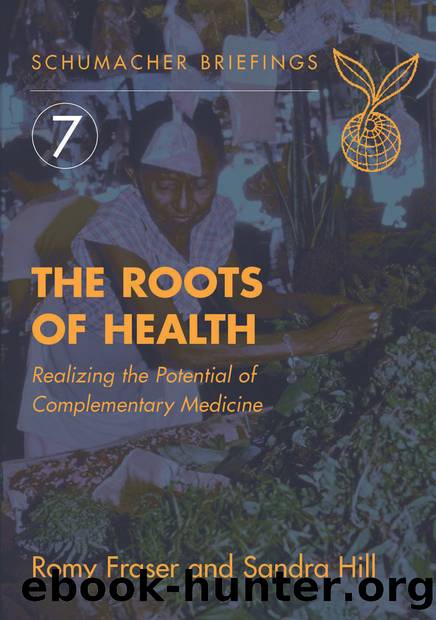Roots of Health by Romy Fraser

Author:Romy Fraser
Language: eng
Format: epub
ISBN: 9780857843760
Publisher: UIT Cambridge Ltd.
Herbalism
Herbalism is the oldest form of medicine known to humankind. Ancient Egyptian writings refer to the medicinal use of 85 herbs, and the Greek writings of Dioscorides list over 400. The Greek’s understanding of herbal medicine was lost to medieval Europe, but this wealth of knowledge was preserved within the Arab world, and re-introduced by the Moors into Southern Spain in the 10th century. Within continental Europe the old Greek or Galenic approach to herbalism has flourished since that time. In Britain, however, herbalism fell into disrepute, partly due to its association with superstitions and witchcraft, and it was not until the late 19th century that it re-emerged with a strong influence from northern America. Nowadays, herbs may be used from the European, Indian or Ayurvedic, Chinese and North and South American traditions. Whatever tradition we study, our knowledge of plants has been handed down by our ancestors. In many cultures, plant medicine is the domain of the shaman. From the language of the Siberian Evenki, the word shaman means one who is both a singer and a seer. The shaman is able to ‘see’ the plant and understand its healing properties. The ‘shaman-healer’ will contact the spirit of the plant, and only then will be able to understand its properties and use the plant effectively.
According to Cherokee legend, it was the animals who brought disease to humankind, to halt their spread over the earth. But the plant kingdom found out and summoned a council at which they decided to provide people with all they needed to overcome this affliction brought to them by the animals.
People have always used plants for healing, and the modern biomedical pharmacopeia contains many drugs isolated from plant sources. Scientific medicine is able to work with these single identifiable chemicals as they are stable and can be tested in the laboratory, but herbalists maintain that it is by using the whole plant that real healing can take place. According to herbalist Andrew Chevallier:
The whole herb is worth more than the sum of its parts and scientific research is increasingly showing that the active constituents of many herbs, for example, those in gingko (Gingko biloba) interact in complex ways to produce the therapeutic effect of the remedy as a whole. Plants contain hundreds if not thousands of different constituent chemicals that interact in complex ways. Frequently, we simply do not know in detail how a particular herb works—even though its medicinal benefit is established.5
Download
This site does not store any files on its server. We only index and link to content provided by other sites. Please contact the content providers to delete copyright contents if any and email us, we'll remove relevant links or contents immediately.
| Administration & Medicine Economics | Allied Health Professions |
| Basic Sciences | Dentistry |
| History | Medical Informatics |
| Medicine | Nursing |
| Pharmacology | Psychology |
| Research | Veterinary Medicine |
Periodization Training for Sports by Tudor Bompa(8276)
Why We Sleep: Unlocking the Power of Sleep and Dreams by Matthew Walker(6727)
Paper Towns by Green John(5194)
The Immortal Life of Henrietta Lacks by Rebecca Skloot(4592)
The Sports Rules Book by Human Kinetics(4393)
Dynamic Alignment Through Imagery by Eric Franklin(4218)
ACSM's Complete Guide to Fitness & Health by ACSM(4060)
Kaplan MCAT Organic Chemistry Review: Created for MCAT 2015 (Kaplan Test Prep) by Kaplan(4014)
Introduction to Kinesiology by Shirl J. Hoffman(3776)
Livewired by David Eagleman(3776)
The Death of the Heart by Elizabeth Bowen(3625)
The River of Consciousness by Oliver Sacks(3606)
Alchemy and Alchemists by C. J. S. Thompson(3524)
Bad Pharma by Ben Goldacre(3428)
Descartes' Error by Antonio Damasio(3280)
The Emperor of All Maladies: A Biography of Cancer by Siddhartha Mukherjee(3164)
The Gene: An Intimate History by Siddhartha Mukherjee(3099)
The Fate of Rome: Climate, Disease, and the End of an Empire (The Princeton History of the Ancient World) by Kyle Harper(3067)
Kaplan MCAT Behavioral Sciences Review: Created for MCAT 2015 (Kaplan Test Prep) by Kaplan(2987)
